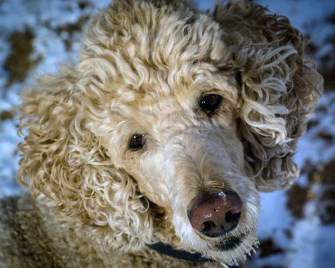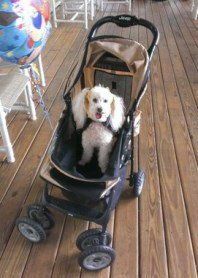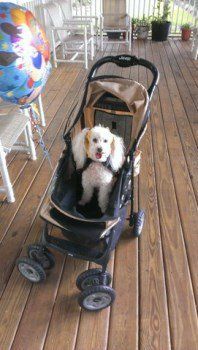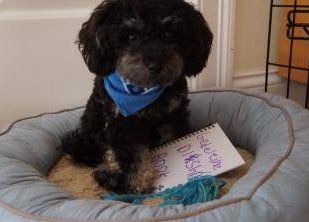Poodle Smells and Odors
Overview
You try to keep your Poodle clean and your puppy or dog looks fantastic.. .but there's a strange smell coming from somewhere and you just can't figure out why your Poodle smells terrible. If so, you're not alone.
There are several common reasons why a Poodle may have an odd odor.
You may be able to detect where the smell is coming from or it may be hard to pinpoint precisely where it is emanating from; however this section will cover all of the most common reasons and exact steps that you can take to get your Poodle smelling fresh and clean again.
All Over Body Smell - Poodle Smells Even After a Bath
In this case, the bad odor that makes your nose wrinkle may appear to be coming from the coat and therefore the entire Poodle will smell bad. This is common even if the puppy or dog has just had a bath within the last few days or weeks and this is one reason why owners can become baffled.
In some cases, a bath won't seem to fix the problem at all or it may be temporary and the Poodle may start to smell bad just hours after being bathed. Since dogs that appear to be clean are stinky, this issue confuses a lot of owners.
Let's take a look at the top culprits for this sort of all-over problem:
1) Improper methods
Baths are actually a bit more complicated than 'wet, lather, rinse' and only by making sure that you cover all of the important steps, while using the proper products can ensure that a Poodle will be cleaned in a way that removes odor and continues to stay smelling nice.
While some Poodles do accumulate dirt and other fine debris, the main purpose of a bath is to rinse away body oils. Body oil (called sebum) is produced via the sebaceous glands and excreted through the skin around the clock, each day.
While this plays an important role in preventing the skin from becoming dry, it also can lead to a terrible smell if it is not properly rinsed away.
Timing-
You'll want to scrub your Poodle from head to toe just about every 3 weeks. If you wash your Poodle too much, the skin can easily become dried out. If you only do a full body cleaning every 5 or 6 weeks, even if your Poodle was inside and did not get dirty, this can cause odor issues.
Scrubbing
- Even if you are bathing your Poodle
at the proper intervals, if it is not done correctly, it can almost be like skipping a session.
At the 3 week point, a good amount of oil has built up on the surface of the skin and has coated the roots of the hair. This oily substance has now accumulated enough to hold in flecks of dried, dead skin, tiny specks of debris, little fragments of dirt and even minuscule specks of food. The oil itself has a rather foul musty odor that can sometimes have a sourly tinge and when you factor in the tiny specks of other substances, it can smell quite terrible.
Due to the tightly packed, curly coat of this breed and the element of the hair being water resistant, you need to scrub deep and thoroughly; if not the oil will not be washed away and this is one of the main reasons why a Poodle will stink even after being shampooed and the smell may actually worsen afterward… every day that this is not properly done, there is more buildup and therefore more unpleasant smell.
It's very easy to mistakenly think you've done a thorough job when in fact only the surface of the coat was cleaned. In this case, the roots of the hair and the entire surface of the body were bypassed and will be covered in a layer of nasty smelling oil.
Product
- The right shampoo will be formulated for canines and will have the correct ingredients to remove the Poodle's natural body lubricants. Remember that oil and water do not mix, and therefore you need the proper cleaning agent to actually do this since rinsing alone will not accomplish much. Using a quality shampoo
that is gentle on the skin yet is effective at washing away smells is vital to successfully keeping a Poodle smelling nice.
The conditioner that you use also plays a role. If it is too thick, it will block skin pores and inhibit air flow, which can lead to bad smells in the hair. Finally, a good leave-in spritz will work to protect the coat from sun and friction damage and also have a pleasant aroma that can last for days.
2) Skin Infection
Skin infections of any kind (yeast, fungal, bacterial) often share the same characteristic of having a foul smell and no amount of grooming
or cleansing will make this go away.
This is sometimes described as a musty smell; yet others will define it as sour or a mixed odor that is difficult to describe in words. In the beginning stages of infection there may not be any other signs other than the strange smell.
As it progresses and without treatment, there may be other symptoms including but not limited to: itching, red bumps, thinning hair and/or peeling skin. Without treatment, the infection can develop deeper into the skin and this can cause nodules of pus. In some cases these will scab over.
If you suspect that your Poodle has a skin infection or if he has a bad odor that is not resolved by bathing, it will be important to have the veterinarian perform a full examination. Skin infections are treated with oral and/or topical medications.
3) Flatulence
This is often overlooked, quite simply because a dog may have a silent gas problem. There are some dogs that pass gas so loudly, the windows shake. However, a Poodle of any variety (toy, mini or standard) may have quite a bit of flatulence
that is released quietly enough that owners do not notice… but they do notice the smell.
Some flatulence is normal; noticed or not, most canines will break wind about 10 times per day, it is the body's way of realizing excess gas from the intestines.
Four main elements are released when gas is passed: oxygen, carbon dioxide, methane and hydrogen sulfide. And it is the hydrogen sulfide that has the noxious smell.
A Poodle can have a bad smell surrounding him if he passes gas in an enclosed room where it is not able to dissipate. In addition, the odor can permeate into fabrics (dog bed, etc.) and this can make it seem like the dog smells bad all the time, when in fact it is lingering odors from past flatulence episodes.
Eating too fast is a common cause and this can be resolved by giving your Poodle his meals in a slow-feeder bowl.
Chronic gassy problems should be discussed with the veterinarian; it often points GI issue that may be due to allergies or a reaction to certain foods.
There are some prozyme powder canine supplements that can help cut down on gas problems; these also help a dog absorb nutrients and can help with Coprophagia.
Smells Coming from a Poodle's Read End
While the rear end of any dog is not the cleanest or the most fresh smelling area, Poodles should not have a constant odor coming from the anus or the vagina.
Let's look at some common reasons why a strong odor may emanate from here:
Stool stuck to hairs around the anus- This is fairly common since most healthy Poodles will have somewhat moist stools (bowel movements should have the consistency of a thick paste) and this can stick to the fine hairs the grown around the anal opening. Just a bit of poo can stink up a room, so there are a couple of things you can do:
1)
It is common for dog groomers to trim this area, solely for this reason. If you do ask the groomer to do this (or if you wish to trim the area yourself), do take care to not clipper this too close since the skin there is very sensitive 2)
You can simply wipe the area with a canine cleansing wipe (those that are used for the face, paws, etc.) after your Poodle is done going to the bathroom.
This way you can rest assured that not only will he smell fine afterward, this will keep tiny specks of poo from being rubbed off onto your furniture, flooring, dog's bed, etc.
Anal glands
- Nothing can really explain the overpowering and noxious smell of anal gland
fluid; some find it even more powerful than a skunk's spray. All dogs have a pair of anal glands; one on each side of the anus. These are also commonly referred to as scent glands since they hold a fluid that is released in very minute amounts each time two dogs meet each other.
Tiny amounts are also released when a dog pushed out a bowel movement. If one or both of those things does not happen enough (i.e. a Poodle has very loose stools), there can be a buildup of this fluid. At that point, if the glands are not expressed (usually done by a groomer or the vet), they can burst open.
If this happens, the fluid will flood out and the smell is extremely intense. In some cases, the glands can pop when a Poodle is poo'ing and once he/she comes back inside, the remnants of that will linger and that is when an owner will smell it…. even though the evidence was left outside on the grass.
If you suspect that this is the cause of your Poodle having a bad smell, it will be important to inspect the area. The broken skin will be vulnerable to infection, which will need to be treated with antibiotics.
Vaginal smell
- With the vulva and the anus being so close together, sometimes a smell from a dog's vagina can be confused with a smell from the anus (and vice-versa). And in some cases, the smell from a Poodle's vagina can be so strong that it lingers on surfaces where the dog sat, rested and/or slept.
This may be a musty smell or an odor that could be compared to vinegar or rotting fish. This sort of issue points to one of several health issues: A urinary tract infection (UTI), bladder infection or yeast infection. Each of these will need to be properly treated by the veterinarian with prescribed medication.
Smell Coming from the Ears
Just about every dog suffers from at least one ear infection in his/her lifetime and a bad smell is a very common sign of this.
Aside from an odor, there is often also itching which may cause a Poodle to rub his head against surfaces or paw at his ears. In many cases you may notice a discharge coming from the ears or a thick buildup of wax.
While some dogs are prone to ear infections, placing cotton in the ears
before a bath to prevent water from entering the canal and keeping an eye on excessive hairs that may need to be plucked out can help to prevent this from happening.
For slight odor issues, it may help to perform an at-home ear cleansing to rinse out wax buildup. If this does not clear up the problem, a vet visit will be in order as prescribed antibiotics may be needed.
Bad Odors Emanating from the Mouth
There are two trains of thought regarding a dog's mouth… they are on opposite ends of the spectrum and both have been widely exaggerated.
Bailey, photo courtesy of Kathleen & Lee Taylor
The first is that a dog's mouth is sterile (not true, it harbors bacteria just like ours) and the other is that it is normal for a dog to have stinky breath (not true; a healthy Poodle will have a neutral smell unless he just ate and you smell the dog food).
Reasons for a bad smell coming from the mouth include:
- A foreign object or even a piece of food stuck between the teeth.
- Tooth decay
- Infection
Since tooth decay can be exceedingly painful and will most often lead to the teeth falling out if not treated, it is important to bring your Poodle to the vet ASAP. In addition, keeping regular vet visits for professional cleanings will help prevent issues in the future.
Let's take a look at how to keep your Poodle's breath smelling nice:
1) At-home brushing
- Chewing on toys and treats will only do so much and certainly not be sufficient to properly clean a Poodle's teeth. Every day, a dog's teeth slowly develop plaque which is a sticky film consisting of bacteria from both food and saliva. If it is not removed, within just a few days it begins to harden into tartar.
Both plaque and tater leads to gum disease and tooth decay.
Even with Poodle puppies this can be a problem, since decay on a milk tooth can affect the adult teeth that have yet to emerge and unhealthy gums will not provide a secure foundation for an adult dog's teeth.
A dog's breath can smell very bad and his teeth will be extremely prone to decay if not correctly brushed on a regular basis. To keep your Poodle's breath smelling nice and to prevent painful decay and loss of teeth, it is recommended to brush your puppy or dog's teeth at least 3 times per week (and every day is really best).
Do take care to use a quality brush (3 sided canine brushes are best) and a really effective paste (cheap brands will not have the proper gentle abrasive elements to remove buildup).
2) Supplemental aides
- Some Poodles need a little bit of extra help with bad breath issues, also referred to as halitosis. Offering quality dental treats that clean the teeth and leave a clean scent is a good choice. Additionally, a quality dog 'mouthwash' (this is actually added to drinking water) can be very effective in combating a Poodle's halitosis.
If a Poodle Smells Bad During the Heat Cycle
Some Poodles can enter and exit the heat cycle with barely any discharge (more common with Toys and Miniatures), however others will have moderate to heavy discharge… and if there is a bad odor, this can be a matter of an owner not realizing how much discharge there actually is.
Since this will occur over the span of approximately 3 weeks, it is often released slowly… there will not be a puddle however there will be a gradual buildup of discharge and endometrial tissue that exits the body and can become matted onto a Poodle's hair. This can begin to smell quite terrible and until a thorough bath is given, the smell will only get worse.
During heat, you may find it helpful to wipe your Poodle's vulva with a quality canine wipe; remembering to wipe from the front to the back (so that bacteria from the anus does not enter the vulva).
Most owners find it best to place a doggie diaper on the female to contain the discharge; this prevents the dog's bed, the carpeting and furniture in the house from attaining a gradual accumulation of fluid as well, which can end up smelling rather bad.
A doggie diaper should be changed every 4 to 12 hours, depending on how heavy the flow is and if any urine has been deposited into the diaper.
Also, if the smell is a bit overpowering, you can bathe your Poodle more often (once a week for just the heat cycle will not affect the coat nor cause dry skin; this only happens if done too often on a regular basis).
It is possible for a female dog to develop a UTI or other infection while in heat, and for this reason if you notice itching, a strong musty smell and/or trouble urinating this should be discussed with the veterinarian.
When a Poodle's Urine Smells
There are actually 2 different facets to this:
1) A Poodle smells like urine and/or smells bad right after peeing outside. This is not that uncommon with young males that may not have full control over where they spray their urine and may end up with some dribbling down their leg or with female Poodle's, depending on how they squat and the relative backsplash of the pee on the grass or ground area.
If any urine ends up on the coat, this can really end up smelling quite bad, especially once you have your Poodle back inside in a closed off room.
The best way to deal with this is to 1)
Make sure that your Poodle pees on the grass, which will better absorb the urine and cause less splashing than if he/she urinated on dirt or a hard surface...
and 2)
wipe the area with an appropriately sized canine wipe once your puppy or dog is done peeing.
2) A Poodle's urine will have a strong smell.
While some say that an intake male dog will have stronger smelling urine than his neutered counterparts, there is no veterinary studies to back this up; however with this said, many owners and groomers will attest to this indeed being the case. Another popular theory is that the food that a Poodle eats can affect the smell of his or her urine. While there is no evidence of this being the case, if a dog ingests poor quality food
over a period of time, this can offset the urine PH, making it acidic which can lead to bacterial infections, thus in turn causing a bad smell.
The most typical proven causes include:
- Slight dehydration - Many dogs are slightly dehydrated and since they are not showing any of the classic symptoms of a more severe problem, owners are unaware. However, if a Poodle's pee is a very dark yellow and/or has a super strong smell (this may be a strong alkaline odor), upping your dog's water intake may be just the ticket. In general, canines need 1 ounce of water per each pound of body weight; however a Poodle may need much more than this depending on health status, activity level, type of food eaten and the temperature.
- UTI or bladder infection
- While both urinary tract infection and lower bladder infections are more common with female dogs, both genders can develop these at any age. And a bladder stone is a slight possibility as well. Aside from a strong, unpleasant smell of urine, other signs include problems urinating (straining, signs of pain and/or only releasing a small amount at a time), cloudy or bloody urine and/or incontinence.
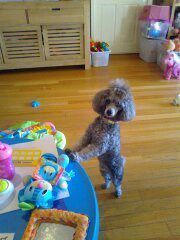
Lolo, 7 years old
Photo courtesy of Lisa
Tips to Keep Your Poodle Smelling Nice
1) Make the bath count.
Give your Poodle a bath every 3 weeks, using a super high quality shampoo and conditioner or finishing spray. Be sure to scrub down to the skin in order to wash away old, accumulated body oil. The goal is to clean both the coat and the skin.
2) Use a quality leave-in spray
that will not only protect the coat, but also leave a lingering clean scent.
3) Keep an eye out for any red flags of a health issue.
This includes but is not limited to rash, itching, hot spots, flaking skin, pawing at the ears, signs of tooth pain and/or cloudy urine. Very strong smelling pee, chronic bad breath or an all-over body odor that will not go away should be reported to the veterinarian.
4) Check your Poodle after he/she goes to the bathroom; use a canine wipe to swipe away any poo or pee that is on the coat.
5) Brush your puppy or dog's teeth
every day (3 times a week is the bare recommended minimum).

